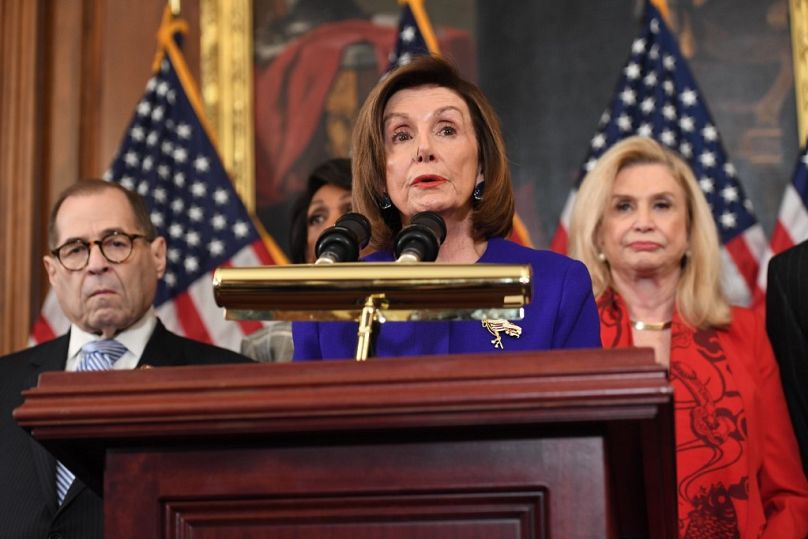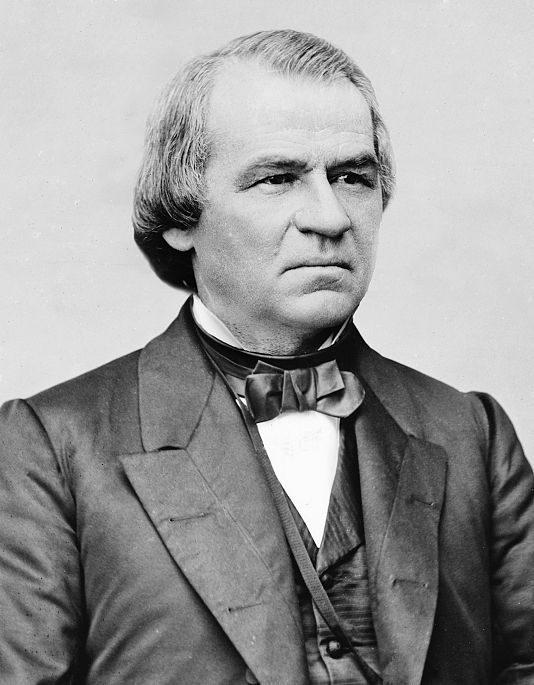The U.S. House of Representatives has voted to impeach President Donald Trump after 10 hours of partisan debate.
Trump becomes only the third president, joining Bill Clinton and Andrew Johnson, to be formally impeached by Congress.
President Richard Nixon also faced impeachment over the Watergate scandal but resigned before the proceedings could take place.
Trump has been impeached over allegations he tried to use military aid to pressure Ukraine’s President Volodymyr Zelensky into investigating his political rival Joe Biden, who is frontrunner to take on Trump in the 2020 election.
Will Donald Trump be removed from office?
It is extremely unlikely. Now he has been impeached by the lower house of Congress, which is controlled by the Democrats, he will face a trial by the Senate.
In order for Trump — who has more support in Republican Party circles — to be removed from office, it would take a two-thirds majority of Senators to vote against him.
The Republicans control the Senate, where each state gets two senators regardless of size.
But in the House of Representatives congressional districts are drawn up based on population sizes. This means traditionally blue states like California and New York have more congresspeople than red states like Alabama or Arkansas.
In order to get the Senate to vote to remove Trump, the Democrats would need to persuade at least 20 Republican senators to back it, which is extremely unlikely – especially when many of them face reelection in 2020 and rely on Trump’s base to support them.
What happens next?
It is likely the U.S. Senate will now move to trial him in the new year.
The constitution’s guidelines for how to impeach a president are vague.
It gives Congress the sole right to impeach a president but leaves it up to the Senate to give the president a fair trial and convict or acquit him of the charges.

As the Senate majority leader, Republican Senator Mitch McConnell will make the decision about what form the inquiry takes and what evidence or witnesses can be used.
Supreme Court Chief Justice John Roberts will oversee the trial and the Senators will act as the jury.
Why is this happening now?
House Speaker Nancy Pelosi moved to begin an impeachment hearing in September after Trump was accused of using the withdrawal of military aid to Ukraine to pressure the country’s president, Volodymyr Zelenskiy, into investigating his political rival Joe Biden.
Under the terms of the constitution, a president can be impeached for “high crimes and misdemeanours” such as an abuse of office.
Trump is accused of using the office of the president to further his own personal, political aims. Former Vice-President Biden is currently running to be the Democratic nominee for president and many Republicans believe he is the one most likely to beat Trump in November 2020.
Pelosi had previously been cautious about starting the impeachment process against Trump when Democrats first took control of the House of Representatives as the move was unlikely to succeed and could cost them politically with voters.
But she changed her mind when the details of the allegations of the “quid pro quo” became apparent earlier this year.

Trump defended his “perfect” phone call with Zelenskiy and demanded a transcript of the call be published.
It was and it showed Trump asking Zelenskiy to begin investigating Joe Biden’s son Hunter Biden and his links to an Ukrainian company Burisma.
At the time, the newly elected Ukrainian leader was hoping for a coveted White House visit to showcase his standing with America, his country’s most important ally.
He was also counting on nearly $400m (€359m) in military aid as his country confronts a hostile neighbour, Russia.
Trump has defended himself against the charges, writing a letter to Pelosi on Tuesday denouncing the “vicious crusade” against him, but he also acknowledged he was powerless to stop the expected outcome.
He said: “When people look back at this affair, I want them to understand it, and learn from it, so that it can never happen to another president again.”
What happened the last time a president was impeached?
The last president to be impeached was Bill Clinton in October 1998 when he was indicted for allegedly lying under oath and obstruction of justice in relation to his denial of an affair with a White House intern and allegations of sexual harassment from when he was the Governor of Arkansas.
The trial in the Senate began in January 1999 and he was acquitted on both counts against him in February.
The only other president to be impeached was Andrew Johnson in 1868. Johnson, who was previously vice-president, unexpectedly became president in 1865 after the assassination of Abraham Lincoln.

Johnson was indicted on a charge of violating a contemporary “tenure of office” law for removing his secretary of war while the Senate was not in session – the law mandating this was repealed a year later.
Johnson, who was a member of the Democratic party who ran with the Republican on a national unity ticket in 1865 after the US civil war, won the impeachment vote by one vote but left office in 1869 after failing to win his party’s nomination.
He is now regarded as one of America’s worst presidents as he was a noted white supremacist and segregationist who resisted attempts to give African Americans the vote.
Richard Nixon was never impeached as he resigned from office before Congress could issue articles of impeachment. He remains the only president who has ever resigned during his term.



